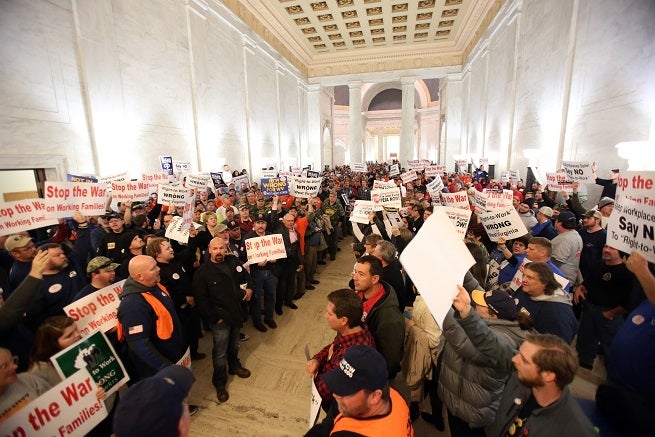Uncategorized
Another RTW Win for Workers in W.Va.

Working families in West Virginia won a much-needed victory last week when Circuit Judge Jennifer Bailey declared key portions of the state’s “right-to-work” law unconstitutional, more than two years after the anti-worker legislation was passed.
Bailey ruled the falsely-named Workplace Freedom Act unconstitutional because it allows workers to refuse to pay dues even though the union must still represent those workers. Unions are required to represent workers at union work sites whether workers are union members or not. Bailey rightly explained that the law “would take unions’ property without any compensation.”
The Teamsters had always contended that the RTW bill passed during the 2016 legislative session was unconstitutional. The proposal was nothing more than an attack on W.Va. workers’ wages, benefits and working conditions.
Bailey wrote that “membership is the lifeblood of any union,” and forcing unions to provide the same services to all workers, whether union members or not, “seriously hampers the unions’ ability to recruit new members and retain old ones,” and amounts to “giving free riders something for nothing.” The Teamsters couldn’t agree more.
The Teamsters filed the lawsuit in August 2016 because the union knew the law violated the rights of West Virginia workers. It also knew that RTW is not about “freedom of choice,” it is about weakening and ultimately destroying the only movement that defends working people on the job—the union movement.
RTW states have lower wages, higher poverty rates, less health benefits and more workplace fatalities. Even Stanley Greer, a spokesman for the anti-labor National Right to Work Committee admitted RTW is wrong when he said, “We’re not purporting to prove that right-to-work produces superior economic performance.”
State elected officials also know that you don’t help the economy by taking money out of workers’ pockets. They know that rebuilding the state’s infrastructure—roads, bridges, water lines, energy grids—is a more common sense solution that helps workers and businesses than enacting RTW laws that only benefit the already wealthy.
Although this was a big victory for working families in West Virginia, unions must remain vigilant and continue to beat back these endless attacks on our wages and benefits—things we have spent decades fighting to achieve. Corporations and their political cronies will never stop trying to weaken unions because they know we are the last line of defense stopping big business from having total control over our government, our laws and our economy. And if unions are going to continue to win victories like this one, they must stand together, get involved and never stop pushing back.